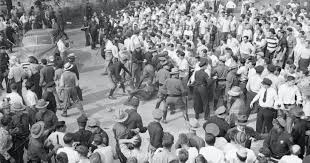Today marks the 75th anniversary of one of the great stands against American fascism, at Peekskill, NY, in 1949. And at the heart of it was the great black American singer, Paul Robeson.
In August 1949, the Civil Rights Congress and a Communist Party-friendly cultural organisation called Peoples’ Artists planned an open air concert near Peekskill, in Westchester County, NY, where the main attraction would be a performance by Paul Robeson. The concert was a fundraiser for the Harlem chapter of the Civil Rights Congress and Howard Fast, the great historical novelist (Spartacus, Freedom Road etc) was to be the compere.
Fast, not as well known in the UK as he should be, was later to distinguish himself by refusing to co-operate with Senator Joe McCarthy’s House Committee on Un-American Activities and was jailed and blacklisted as a consequence. In 1949 he was a member of the Communist Party of the USA. He later recorded what happened at Peekskill in his book ‘Peekskill USA’, describing it as as “the first great open manifestation of American fascism”.

At that time, Paul Robeson had been speaking out increasingly against the KKK and American racism, particularly focussing on the role of black troops fighting during the second world war. The far right became incensed, and the local chapter of the American Legion started to mobilise opposition. Although the Legion began life as a veterans organisation after the first world war, it had quickly morphed into a far right, anti-working class outfit which attacked trade union organisations, striking workers and anyone else it deemed communist.
Paul Robeson fell squarely in their sights.

On the day of the concert, several hundred local merican Legion members, Westchester Klansmen and various other racists and right wingers launched a vicious wave of assaults on those arriving early at the open air concert ground. Many were savagely beaten with rocks and clubs. An effigy of Robeson and a huge cross were burnt on a hillside opposite the concert ground. The few police who turned up stood by and did nothing. The concert had to be called off and the American Legion crowed that it had stopped the “commie” Robeson from singing.

But their victory was only temporary. A week later, on 4 September, the concert took place and this time over two thousand trade union stewards from the Longshoremen’s Union, the United Electrical Workers and others formed a human cordon around the entire concert site to keep the fascists at bay. And, in response to fears that someone would try to shoot Robeson while he performed, fifteen ex-military vets, black and white, formed a shield around him ready to take any bullet intended for him. More than 20,000 people then heard Robeson sing.

But they hadn’t accounted for the aftermath. The Legion had mobilised again and hundreds of fascists and racists lined the only exit allowed by police, ambushing concert-goers as they left the site. Many were attacked with rocks and weapons as they tried to drive away. There were more casualties later when hundreds of police entered the concert site and attacked the trade union stewards who had provided security for the event.

But despite the casualties – over 150 ended up in hospital – the violence represented little more than the spiteful, enraged grunt of defeat from the fascists. For, in the end, Robeson did sing, and Robeson was heard.
Howard Fast, Pete Seeger and Robeson himself recorded their account of the Peekskill events on a wonderful 78 rpm record “Our Song Will Go On” which you can listen to here:
Interestingly, last week was also the anniversary of the judicial murder of Nicola Sacco and Bartolomeo Vanzetti, two Italian immigrant anarchists executed in Massachusetts in 1927 for a robbery and murder they almost certainly had nothing to do with. Their case is also memorialised by Howard Fast in his splendid, elegant novel, The Passion of Sacco and Vanzetti.


Leave a comment